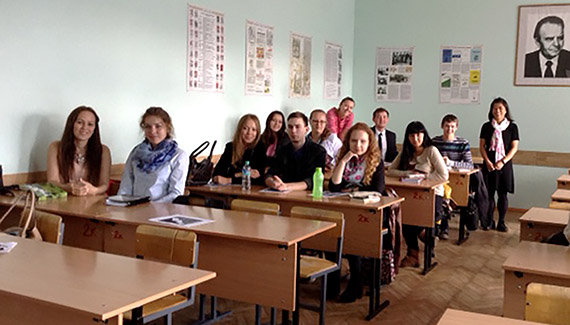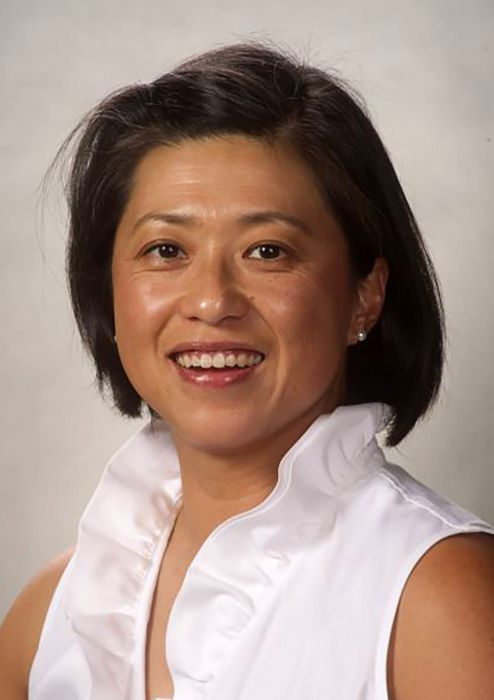
As California State University, Dominguez Hills (CSUDH) professor of history Kate Fawver focused on teaching United States history at Udmurt State University in Izhevsk, the capital of the Udmurt Republic in Russia, she also enjoyed the opportunity to share her culture and learn about daily life in the provinces of Russia.
Fawver returned to the U.S. on August 1 after spending a year as a visiting Fulbright U.S. Scholar in Russia. She was one of three CSUDH Fulbright Scholarship recipients for the 2014-2015 academic year, including Kim Trimble, professor of teacher education, who taught in Turkey, and Nancy Erbe, professor of negotiation, conflict resolution and peace building, who served as Fulbright distinguished chair at Pontifícia Universidade Católica in Rio de Janeiro in the spring.

“I cannot stress how warmly I was received and supported. I found the Russians to be engaging and interested in speaking with me,” said Fawver of the people in the Udmurt Republic, which is approximately 900 miles east of Moscow. “I genuinely enjoyed the opportunity, and I hope that it was not a singular experience–a Fulbright scholarship usually is–because travel of this kind is exactly the kind exchange that benefits both countries in general, and our students in particular.”
The Fulbright program is sponsored by the U.S. Department of State and is one of the most prestigious international education exchange programs in the world designed to increase mutual understanding between peoples from the U.S. and other countries. The core Fulbright U.S. Scholars program sends approximately 800 American scholars and professors each year to more than 125 countries to teach and conduct research in a wide variety of academic and professional fields.
CSUDH was among the nation’s top producers of Fulbright scholars in the U.S. last academic year, and is a sponsor of TedXFulbright 2015 on Sept. 26 in Santa Monica.
“I am grateful to the Department of History, and the College of Arts and Humanities for the sabbatical,” said Fawver. “Fulbright grants like mine underscore the university’s long-term commitment to international education.”
While at Udmurt, Fawver taught courses in early American history, the American Revolution, the Civil War, and American family history. She delivered keynote lectures on American federalism, the rise of American democracy, and the history of American capitalism.
Outside of the classroom, Fawver enjoyed daily cultural interactions with not only her students, but the residents of Izhevsk in such places as stores, libraries and on public transportation.
“There is a whole new generation in Russia that has never met Americans before. It was an exciting experience considering the current political climate between Washington D.C. and Moscow,” she said. “Meeting Russians and speaking with them in-depth was illuminating, particularly when it came to the kind of misconceptions we hold about each other.”
Access to American television shows have created an unrealistic “caricature” of Americans for many young Russians, according to Fawver.
“Russians see American television programing or films and the tendency for some is to think of Americans as an excessive, self-absorbed, and indifferent people. An unfortunate legacy of the Cold War is the global perception that many Americans consider themselves to be a moral authority for the rest of the world,” said Fawver. “My students asked me questions about American foreign and domestic policies, which would inevitably lead to lengthy discussions and debates in both the Russian and English languages. They learned quickly that not all American citizens fully support Washington’s position on such things as Ukraine, or that many Americans object to the U.S. government’s diplomatic coldness toward Moscow.”
Russian history is much “larger” than American history, not only as a field of study for Russian students, but also because it spans more than a dozen centuries. American history, conversely, is interesting to Russians because of its relative infancy, according to Fawver.
“They’re very interested in the history of the United States, and one reason is that 240 years of history is just a drop in the bucket to them,” she said. “Questions about the current presidential administration and contemporary life in the United States always involved questions about the how American history shaped the American present.”
Along with teaching at Udmurt State University, Fawver also gave talks to its academic community at large regarding the origins of American federalism.
“Federalism in Russia means something very different compared to the United States. The origins of American federalism are of great interest to the average Russian citizen” said Fawver. “Additionally, the Udmurt Republic is the one of the most ethnically diverse regions in all of the Russian Federation. I found them to be interested to learn how immigrants to the United States shaped American history. To this end, I shared with them the history of the Chinese and other minority populations in America.
“Not only were my colleagues at Udmurt State interested in the content of American history, they were also interested in the pedagogical practices employed by historians in American higher education,” she added. “I led a workshop on the role of critical thinking in the baccalaureate degree in American universities. The interest stems from the fact that the higher education system in Russia is very different to that found in the United States.”
In Russia, college students take five years of intensive training, and general education breadth is provided at the high school level, according to Fawver.
“The pathway that undergraduate history students follow at Udmurt State University is different because of the way in which Russian universities are organized. Within the broader study of the historical discipline, one finds such subfields as economics, demography, political science, and international relations,” she said. “Like history majors here, Russian students have a wide variety of career options. They could pursue professional history or they might be archivists, diplomats, lawyers, or politicians.”
Fawver found Russia’s higher education curriculum fascinating, and believes some if its structures could complement U.S. higher education, and vice versa.
“There are numerous concrete benefits to the intensive training of students for five years. Higher education in Russia is also relatively affordable, so students devote all their energy to their matriculation, unlike the United States where many students have to balance work and school,” she said.”